Graduation Ceremony Speech
- 格式:doc
- 大小:24.00 KB
- 文档页数:2
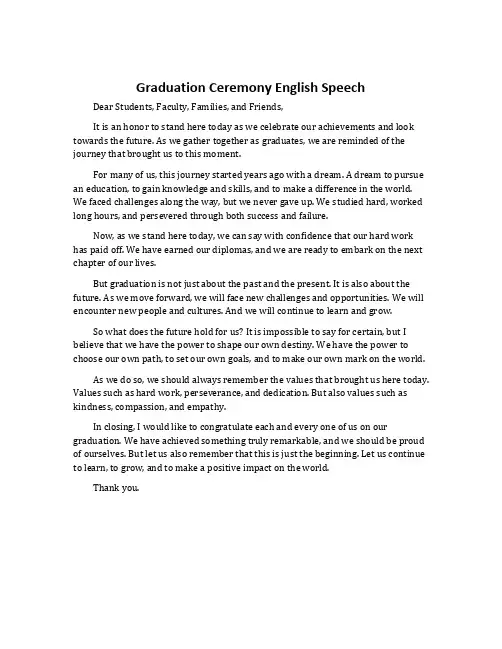
Graduation Ceremony English Speech Dear Students, Faculty, Families, and Friends,It is an honor to stand here today as we celebrate our achievements and look towards the future. As we gather together as graduates, we are reminded of the journey that brought us to this moment.For many of us, this journey started years ago with a dream. A dream to pursue an education, to gain knowledge and skills, and to make a difference in the world. We faced challenges along the way, but we never gave up. We studied hard, worked long hours, and persevered through both success and failure.Now, as we stand here today, we can say with confidence that our hard work has paid off. We have earned our diplomas, and we are ready to embark on the next chapter of our lives.But graduation is not just about the past and the present. It is also about the future. As we move forward, we will face new challenges and opportunities. We will encounter new people and cultures. And we will continue to learn and grow.So what does the future hold for us? It is impossible to say for certain, but I believe that we have the power to shape our own destiny. We have the power to choose our own path, to set our own goals, and to make our own mark on the world.As we do so, we should always remember the values that brought us here today. Values such as hard work, perseverance, and dedication. But also values such as kindness, compassion, and empathy.In closing, I would like to congratulate each and every one of us on our graduation. We have achieved something truly remarkable, and we should be proud of ourselves. But let us also remember that this is just the beginning. Let us continue to learn, to grow, and to make a positive impact on the world.Thank you.。
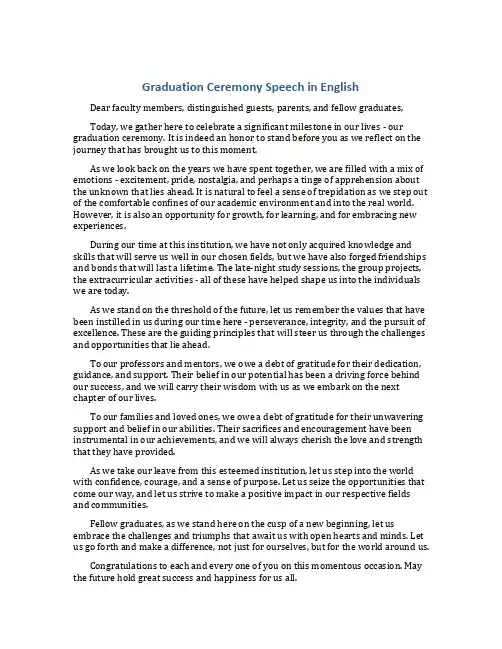
Graduation Ceremony Speech in English Dear faculty members, distinguished guests, parents, and fellow graduates,Today, we gather here to celebrate a significant milestone in our lives - our graduation ceremony. It is indeed an honor to stand before you as we reflect on the journey that has brought us to this moment.As we look back on the years we have spent together, we are filled with a mix of emotions - excitement, pride, nostalgia, and perhaps a tinge of apprehension about the unknown that lies ahead. It is natural to feel a sense of trepidation as we step out of the comfortable confines of our academic environment and into the real world. However, it is also an opportunity for growth, for learning, and for embracing new experiences.During our time at this institution, we have not only acquired knowledge and skills that will serve us well in our chosen fields, but we have also forged friendships and bonds that will last a lifetime. The late-night study sessions, the group projects, the extracurricular activities - all of these have helped shape us into the individuals we are today.As we stand on the threshold of the future, let us remember the values that have been instilled in us during our time here - perseverance, integrity, and the pursuit of excellence. These are the guiding principles that will steer us through the challenges and opportunities that lie ahead.To our professors and mentors, we owe a debt of gratitude for their dedication, guidance, and support. Their belief in our potential has been a driving force behind our success, and we will carry their wisdom with us as we embark on the next chapter of our lives.To our families and loved ones, we owe a debt of gratitude for their unwavering support and belief in our abilities. Their sacrifices and encouragement have been instrumental in our achievements, and we will always cherish the love and strength that they have provided.As we take our leave from this esteemed institution, let us step into the world with confidence, courage, and a sense of purpose. Let us seize the opportunities that come our way, and let us strive to make a positive impact in our respective fields and communities.Fellow graduates, as we stand here on the cusp of a new beginning, let us embrace the challenges and triumphs that await us with open hearts and minds. Let us go forth and make a difference, not just for ourselves, but for the world around us.Congratulations to each and every one of you on this momentous occasion. May the future hold great success and happiness for us all.Thank you.。
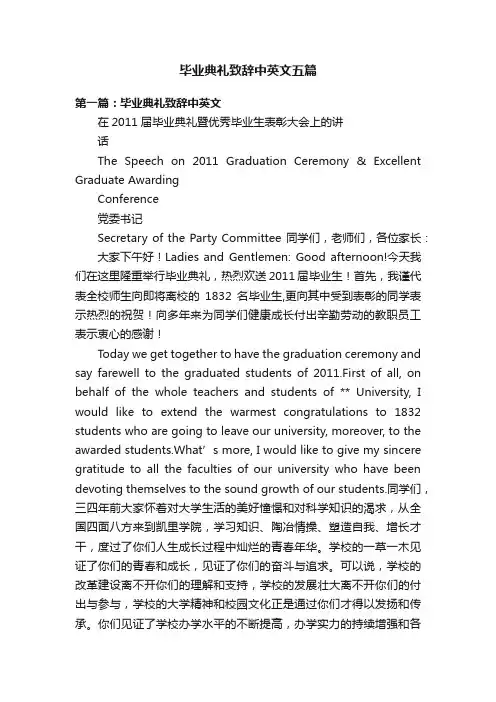
毕业典礼致辞中英文五篇第一篇:毕业典礼致辞中英文在2011届毕业典礼暨优秀毕业生表彰大会上的讲话The Speech on 2011 Graduation Ceremony & Excellent Graduate AwardingConference党委书记Secretary of the Party Committee 同学们,老师们,各位家长:大家下午好!Ladies and Gentlemen: Good afternoon!今天我们在这里隆重举行毕业典礼,热烈欢送2011届毕业生!首先,我谨代表全校师生向即将离校的1832名毕业生,更向其中受到表彰的同学表示热烈的祝贺!向多年来为同学们健康成长付出辛勤劳动的教职员工表示衷心的感谢!Today we get together to have the graduation ceremony and say farewell to the graduated students of 2011.First of all, on behalf of the whole teachers and students of ** University, I would like to extend the warmest congratulations to 1832 students who are going to leave our university, moreover, to the awarded students.What’s more, I would like to give my sin cere gratitude to all the faculties of our university who have been devoting themselves to the sound growth of our students.同学们,三四年前大家怀着对大学生活的美好憧憬和对科学知识的渴求,从全国四面八方来到凯里学院,学习知识、陶冶情操、塑造自我、增长才干,度过了你们人生成长过程中灿烂的青春年华。
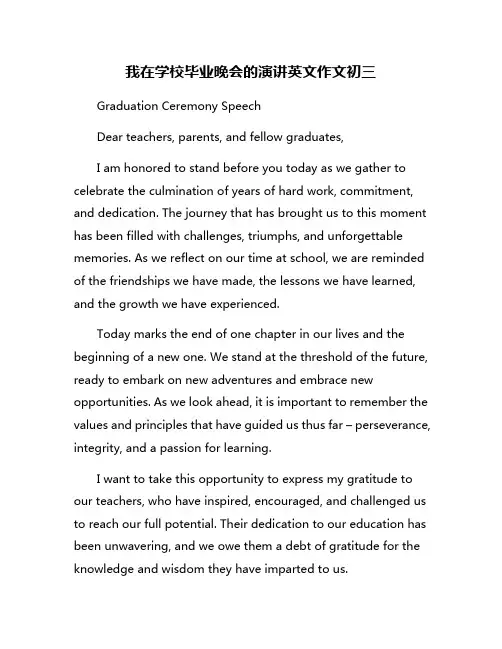
我在学校毕业晚会的演讲英文作文初三Graduation Ceremony SpeechDear teachers, parents, and fellow graduates,I am honored to stand before you today as we gather to celebrate the culmination of years of hard work, commitment, and dedication. The journey that has brought us to this moment has been filled with challenges, triumphs, and unforgettable memories. As we reflect on our time at school, we are reminded of the friendships we have made, the lessons we have learned, and the growth we have experienced.Today marks the end of one chapter in our lives and the beginning of a new one. We stand at the threshold of the future, ready to embark on new adventures and embrace new opportunities. As we look ahead, it is important to remember the values and principles that have guided us thus far – perseverance, integrity, and a passion for learning.I want to take this opportunity to express my gratitude to our teachers, who have inspired, encouraged, and challenged us to reach our full potential. Their dedication to our education has been unwavering, and we owe them a debt of gratitude for the knowledge and wisdom they have imparted to us.I also want to thank our parents, who have supported us, believed in us, and cheered us on every step of the way. Their love and encouragement have been our rock, and we are immensely grateful for their unwavering support throughout our educational journey.As we say goodbye to our school and look towards the future, let us remember the lessons we have learned, the friendships we have formed, and the memories we have created. Let us approach the next phase of our lives with courage, determination, and an open mind.Congratulations to my fellow graduates – we have achieved a significant milestone, and I have no doubt that we will continue to achieve greatness in all that we do. As we move forward into the world beyond school, may we always remember the lessons we have learned, the friendships we have made, and the potential that lies within each of us.Thank you, and congratulations to the graduating class of [year]. The future is ours to shape, and I have no doubt that we will make a lasting impact on the world. Thank you.。
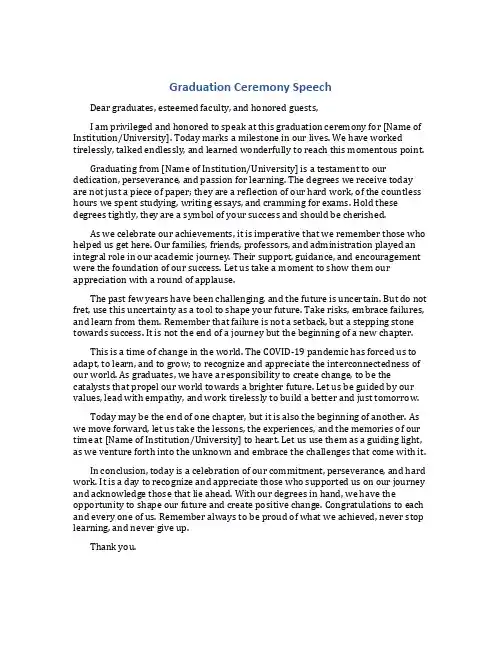
Graduation Ceremony SpeechDear graduates, esteemed faculty, and honored guests,I am privileged and honored to speak at this graduation ceremony for [Name of Institution/University]. Today marks a milestone in our lives. We have worked tirelessly, talked endlessly, and learned wonderfully to reach this momentous point.Graduating from [Name of Institution/University] is a testament to our dedication, perseverance, and passion for learning. The degrees we receive today are not just a piece of paper; they are a reflection of our hard work, of the countless hours we spent studying, writing essays, and cramming for exams. Hold these degrees tightly, they are a symbol of your success and should be cherished.As we celebrate our achievements, it is imperative that we remember those who helped us get here. Our families, friends, professors, and administration played an integral role in our academic journey. Their support, guidance, and encouragement were the foundation of our success. Let us take a moment to show them our appreciation with a round of applause.The past few years have been challenging, and the future is uncertain. But do not fret, use this uncertainty as a tool to shape your future. Take risks, embrace failures, and learn from them. Remember that failure is not a setback, but a stepping stone towards success. It is not the end of a journey but the beginning of a new chapter.This is a time of change in the world. The COVID-19 pandemic has forced us to adapt, to learn, and to grow; to recognize and appreciate the interconnectedness of our world. As graduates, we have a responsibility to create change, to be the catalysts that propel our world towards a brighter future. Let us be guided by our values, lead with empathy, and work tirelessly to build a better and just tomorrow.Today may be the end of one chapter, but it is also the beginning of another. As we move forward, let us take the lessons, the experiences, and the memories of our time at [Name of Institution/University] to heart. Let us use them as a guiding light, as we venture forth into the unknown and embrace the challenges that come with it.In conclusion, today is a celebration of our commitment, perseverance, and hard work. It is a day to recognize and appreciate those who supported us on our journey and acknowledge those that lie ahead. With our degrees in hand, we have the opportunity to shape our future and create positive change. Congratulations to each and every one of us. Remember always to be proud of what we achieved, never stop learning, and never give up.Thank you.。
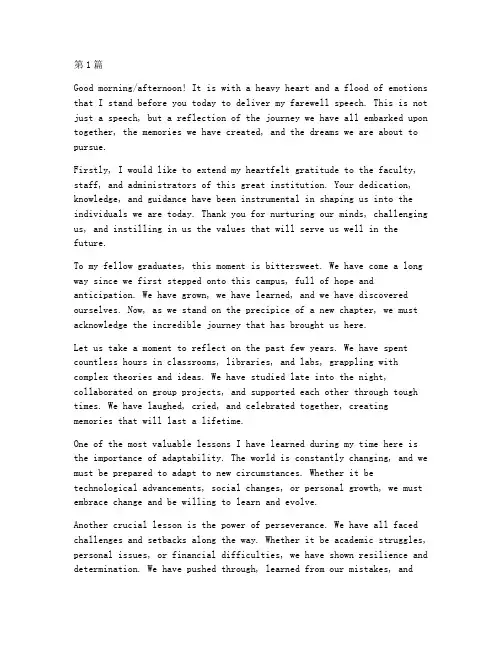
第1篇Good morning/afternoon! It is with a heavy heart and a flood of emotions that I stand before you today to deliver my farewell speech. This is not just a speech, but a reflection of the journey we have all embarked upon together, the memories we have created, and the dreams we are about to pursue.Firstly, I would like to extend my heartfelt gratitude to the faculty, staff, and administrators of this great institution. Your dedication, knowledge, and guidance have been instrumental in shaping us into the individuals we are today. Thank you for nurturing our minds, challenging us, and instilling in us the values that will serve us well in the future.To my fellow graduates, this moment is bittersweet. We have come a long way since we first stepped onto this campus, full of hope and anticipation. We have grown, we have learned, and we have discovered ourselves. Now, as we stand on the precipice of a new chapter, we must acknowledge the incredible journey that has brought us here.Let us take a moment to reflect on the past few years. We have spent countless hours in classrooms, libraries, and labs, grappling with complex theories and ideas. We have studied late into the night, collaborated on group projects, and supported each other through tough times. We have laughed, cried, and celebrated together, creating memories that will last a lifetime.One of the most valuable lessons I have learned during my time here is the importance of adaptability. The world is constantly changing, and we must be prepared to adapt to new circumstances. Whether it be technological advancements, social changes, or personal growth, we must embrace change and be willing to learn and evolve.Another crucial lesson is the power of perseverance. We have all faced challenges and setbacks along the way. Whether it be academic struggles, personal issues, or financial difficulties, we have shown resilience and determination. We have pushed through, learned from our mistakes, andemerged stronger. This perseverance will serve us well as we step into the real world.As we bid farewell to our university, we must also say goodbye to the friendships that have become a significant part of our lives. The bonds we have formed with our classmates, professors, and mentors will never be forgotten. We have shared laughter, tears, and everything in between. These relationships have shaped us into the people we are today, and we will carry them with us as we move forward.Now, as we embark on our respective paths, we must remember the values that have been instilled in us. Integrity, respect, compassion, and empathy are just a few of the principles that will guide us in ourfuture endeavors. Let us strive to be ethical leaders, to make apositive impact on the world, and to never lose sight of our values.As we leave the university, we must also take pride in our achievements. We have earned our degrees, and we have proven that we have the knowledge and skills to succeed. However, success is not just about the accolades and titles we acquire. True success lies in the fulfillment we find in our work, the relationships we build, and the lives we touch.As we move forward, let us not forget the lessons we have learned here. Let us remain curious, continue to learn, and seek knowledge. Let us be open to new experiences and be willing to take risks. Let us embrace the unknown and face it with courage and determination.To the faculty, staff, and administrators, thank you for everything. Your dedication has made this university a place where we have grown and flourished. We are grateful for the opportunities you have provided us and the support you have shown us.To my fellow graduates, let us remember that we are not alone in this journey. We have each other, and together, we can achieve great things. Let us support one another, share our successes, and lift each other up when we face adversity.In closing, I would like to leave you with a quote from Nelson Mandela: "Education is the most powerful weapon which you can use to change theworld." As we leave this university, let us use our education to make a difference in the world. Let us be agents of change, advocates for justice, and champions of progress.As we bid farewell to this chapter of our lives, let us do so with gratitude, hope, and excitement for what lies ahead. We are ready to face the world, ready to make a difference, and ready to create our own stories.Thank you, and congratulations, Class of [Year].May the road rise to meet us, may the wind be at our backs, and may the sun shine upon us.Godspeed, graduates.第2篇Good morning! It is with a heart full of gratitude and a mind brimming with memories that I stand before you today to deliver my graduation speech. This is a momentous occasion for all of us, as we are about to embark on a new chapter in our lives. As we bid farewell to our beloved university, let us reflect on the experiences, friendships, and knowledge we have gained during our time here.First and foremost, I would like to extend my heartfelt gratitude to our esteemed professors, who have been our guiding lights throughout our academic journey. Their dedication, patience, and passion for teaching have not only shaped our intellectual growth but also inspired us to become lifelong learners. We are fortunate to have had the opportunity to learn from such exceptional educators who have left an indelible mark on our lives.As we look back, it is impossible to overlook the incredible friendships we have forged during our time at university. The bonds we have formed with our classmates have been the highlight of our college experience. We have shared laughter, tears, and countless moments of joy and sorrow together. These friendships have not only enriched our lives but have also prepared us for the challenges and opportunities that lie ahead. Wehave learned the importance of empathy, understanding, and support, which are essential qualities for navigating the complexities of the world.In addition to our personal growth, our time at university has equipped us with a wealth of knowledge and skills that will serve us well in our future endeavors. We have delved into various subjects, exploring the depths of our interests and expanding our horizons. We have honed our critical thinking abilities, developed our communication skills, and learned the value of teamwork and collaboration. These skills will undoubtedly play a crucial role in our professional and personal lives, enabling us to make a positive impact in our chosen fields.As we leave the familiar surroundings of our university, it is essential to acknowledge the gratitude we owe to our families and loved ones. They have been our pillars of strength, providing unwavering support and encouragement throughout our academic journey. Their sacrifices and belief in our abilities have been instrumental in shaping theindividuals we have become. We owe them a debt of gratitude that can never be fully repaid, but we can honor their love and support by striving to achieve our dreams and aspirations.As we move forward, it is important to remember that the world is vast and full of possibilities. We are now equipped with the knowledge, skills, and confidence to navigate the challenges and seize the opportunities that await us. However, it is crucial to remain humble and open-minded. The journey ahead may not always be smooth, but it is through adversity that we grow and learn. We must embrace change, adapt to new situations, and be willing to step out of our comfort zones. Only by embracing the unknown can we truly fulfill our potential and make a difference in the world.In conclusion, today marks the end of an era, but it is also the beginning of a new chapter in our lives. As we bid farewell to our university, let us carry with us the lessons we have learned, the friendships we have forged, and the dreams we have pursued. Let us remain grateful for the opportunities that have been presented to us and the people who have supported us along the way.As we step into the future, let us be courageous, resilient, and compassionate. Let us strive to make a positive impact in our careers, communities, and the world at large. Let us remember that success is not solely measured by our achievements but by the kindness and compassion we show to others.In closing, I would like to express my deepest gratitude to all the professors, staff, and administrators who have contributed to our academic and personal growth. We are truly fortunate to have had such a remarkable experience at this university. As we move forward, let us carry the spirit of gratitude, friendship, and knowledge that we have gained here with us.Thank you, and congratulations to all of us on this wonderful achievement. Here's to the future, and may we all soar to new heights!Thank you.第3篇Good morning/afternoon/evening, esteemed faculty, proud parents, beloved friends, and most importantly, my fellow graduates. Today, we stand at the precipice of a new chapter in our lives, one that is filled with excitement, uncertainty, and a plethora of opportunities. As we gather here to celebrate the culmination of our academic journey, I am honored to stand before you to deliver this graduation speech.First and foremost, I would like to extend my heartfelt gratitude to everyone who has been a part of my college experience. To my professors, thank you for your unwavering dedication and passion for teaching. Your lectures, discussions, and guidance have not only enriched my knowledge but also shaped my character. To my parents, you have been my rock, providing unwavering support and encouragement. Your sacrifices have made this moment possible, and I am forever grateful. To my friends, you have been my confidants, companions, and supporters. Your laughter, tears, and shared experiences have made these past four years unforgettable. Lastly, to my fellow graduates, thank you for the camaraderie, the support, and the unforgettable memories.As we reflect on our time here, it is important to acknowledge the challenges we have faced. The rigorous coursework, the late-night study sessions, the exams, and the countless assignments have tested our resilience and perseverance. However, it is through these trials that we have grown and developed as individuals. We have learned to manage our time, balance our priorities, and overcome obstacles. These experiences have equipped us with the skills and knowledge necessary to succeed in the real world.Today, we are not just celebrating the end of our academic journey but also the beginning of a new one. The world awaits us, and it is filled with endless possibilities. As we step into this new chapter, I would like to offer some words of wisdom that I believe will serve us well:1. Embrace change: The world is constantly evolving, and we must be willing to adapt and grow with it. Change can be daunting, but it also presents us with new opportunities and challenges. Embrace change, and let it propel you towards success.2. Stay curious: Curiosity is the essence of learning. Never stop asking questions, seeking knowledge, and expanding your horizons. The more you learn, the more you grow, and the more you contribute to the world around you.3. Cultivate relationships: The people we meet and the relationships we build are invaluable. Surround yourself with positive, supportive individuals who inspire you to be your best self. Remember that true friendship is about giving and receiving, and it is a bond that can last a lifetime.4. Take risks: Life is too short to play it safe. Step out of your comfort zone, take calculated risks, and pursue your dreams. You may fail, but each failure is a lesson learned and a step closer to success.5. Be grateful: Gratitude is a powerful force that can transform our lives. Take the time to appreciate the little things, express your gratitude to others, and remember that a life of gratitude is a life of abundance.As we leave this institution, we carry with us a wealth of knowledge, experiences, and memories. We are now equipped with the tools to make a positive impact on the world. Let us not forget the values we have learned here, such as integrity, respect, and compassion.In conclusion, today marks the end of an era and the beginning of a new journey. As we move forward, let us remain connected to our roots, tothe values we have learned, and to each other. Let us be the change we wish to see in the world, and let us make a difference in the lives of those around us.To my fellow graduates, let us take this moment to celebrate our achievements, to honor our past, and to look forward to our future. Let us hold onto the memories we have created, the lessons we have learned, and the friendships we have forged. And let us remember that we arenever truly alone, for we have each other, and we have the strength to face whatever lies ahead.Congratulations, Class of [Year]. The world is yours to conquer, and I have no doubt that you will do so with grace, determination, and success. Thank you, and Godspeed.Now, let's raise our glasses to the future, to the endless possibilities that await us, and to the incredible journey that has brought us to this day.Cheers!。
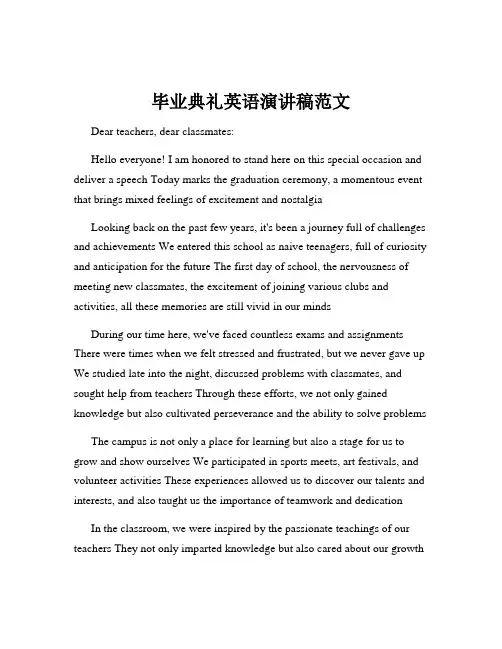
毕业典礼英语演讲稿范文Dear teachers, dear classmates:Hello everyone! I am honored to stand here on this special occasion and deliver a speech Today marks the graduation ceremony, a momentous event that brings mixed feelings of excitement and nostalgiaLooking back on the past few years, it's been a journey full of challenges and achievements We entered this school as naive teenagers, full of curiosity and anticipation for the future The first day of school, the nervousness of meeting new classmates, the excitement of joining various clubs and activities, all these memories are still vivid in our mindsDuring our time here, we've faced countless exams and assignments There were times when we felt stressed and frustrated, but we never gave up We studied late into the night, discussed problems with classmates, and sought help from teachers Through these efforts, we not only gained knowledge but also cultivated perseverance and the ability to solve problemsThe campus is not only a place for learning but also a stage for us to grow and show ourselves We participated in sports meets, art festivals, and volunteer activities These experiences allowed us to discover our talents and interests, and also taught us the importance of teamwork and dedicationIn the classroom, we were inspired by the passionate teachings of our teachers They not only imparted knowledge but also cared about our growthand wellbeing Their patience and wisdom guided us through difficult times and encouraged us to pursue excellenceNow, as we graduate, we are about to embark on a new journey Some of us will enter universities to continue our studies, while others will step into the society and start working No matter which path we choose, we should be brave and confidentThe future may be full of uncertainties and challenges, but we should believe in our abilities We have learned the necessary skills and knowledge in school, and we have the determination and courage to overcome difficulties Let's keep our dreams in mind and strive towards themAt the same time, we should also be grateful Grateful to our parents for their unconditional love and support, grateful to our teachers for their teachings and care, and grateful to our classmates and friends for their companionship and encouragementFinally, I would like to say that graduation is not the end but a new beginning Let's embrace the future with a positive attitude and create a brilliant tomorrow Thank you all!That's all for my speech Thank you!。
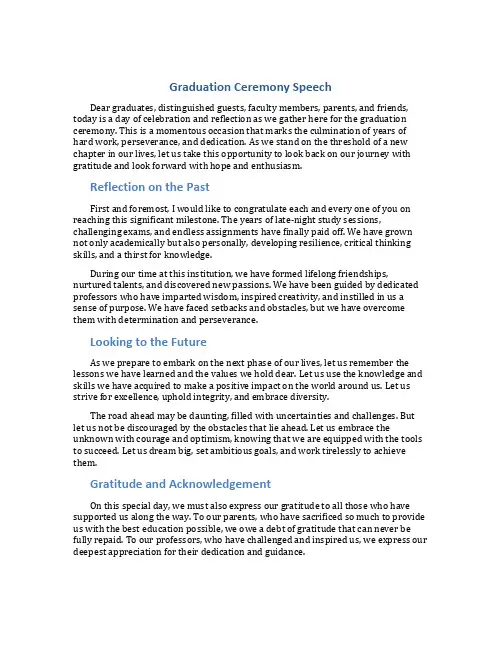
Graduation Ceremony SpeechDear graduates, distinguished guests, faculty members, parents, and friends, today is a day of celebration and reflection as we gather here for the graduation ceremony. This is a momentous occasion that marks the culmination of years of hard work, perseverance, and dedication. As we stand on the threshold of a new chapter in our lives, let us take this opportunity to look back on our journey with gratitude and look forward with hope and enthusiasm.Reflection on the PastFirst and foremost, I would like to congratulate each and every one of you on reaching this significant milestone. The years of late-night study sessions, challenging exams, and endless assignments have finally paid off. We have grown not only academically but also personally, developing resilience, critical thinking skills, and a thirst for knowledge.During our time at this institution, we have formed lifelong friendships, nurtured talents, and discovered new passions. We have been guided by dedicated professors who have imparted wisdom, inspired creativity, and instilled in us a sense of purpose. We have faced setbacks and obstacles, but we have overcome them with determination and perseverance.Looking to the FutureAs we prepare to embark on the next phase of our lives, let us remember the lessons we have learned and the values we hold dear. Let us use the knowledge and skills we have acquired to make a positive impact on the world around us. Let us strive for excellence, uphold integrity, and embrace diversity.The road ahead may be daunting, filled with uncertainties and challenges. But let us not be discouraged by the obstacles that lie ahead. Let us embrace the unknown with courage and optimism, knowing that we are equipped with the tools to succeed. Let us dream big, set ambitious goals, and work tirelessly to achieve them.Gratitude and AcknowledgementOn this special day, we must also express our gratitude to all those who have supported us along the way. To our parents, who have sacrificed so much to provide us with the best education possible, we owe a debt of gratitude that can never be fully repaid. To our professors, who have challenged and inspired us, we express our deepest appreciation for their dedication and guidance.We must also acknowledge the efforts of our classmates, who have shared in our joys and sorrows, and have stood by us through thick and thin. Together, we have formed a tight-knit community that will always hold a special place in our hearts.ConclusionIn conclusion, as we bid farewell to this chapter of our lives and look towards the horizon of new beginnings, let us remember the words of Ralph Waldo Emerson:。
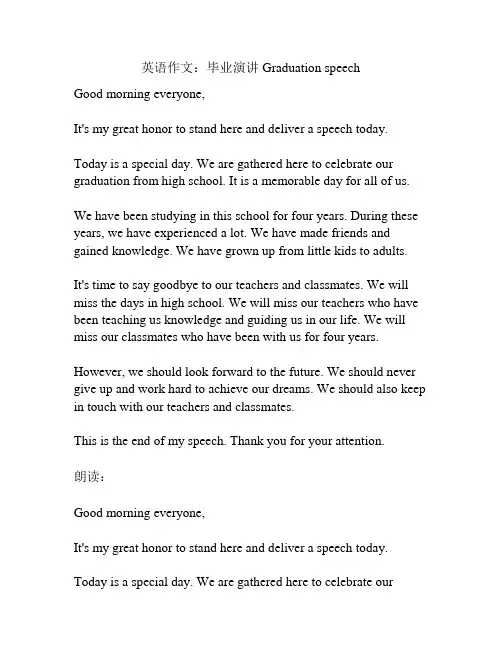
英语作文:毕业演讲 Graduation speechGood morning everyone,It's my great honor to stand here and deliver a speech today.Today is a special day. We are gathered here to celebrate our graduation from high school. It is a memorable day for all of us.We have been studying in this school for four years. During these years, we have experienced a lot. We have made friends and gained knowledge. We have grown up from little kids to adults.It's time to say goodbye to our teachers and classmates. We will miss the days in high school. We will miss our teachers who have been teaching us knowledge and guiding us in our life. We will miss our classmates who have been with us for four years. However, we should look forward to the future. We should never give up and work hard to achieve our dreams. We should also keep in touch with our teachers and classmates.This is the end of my speech. Thank you for your attention.朗读:Good morning everyone,It's my great honor to stand here and deliver a speech today.Today is a special day. We are gathered here to celebrate ourgraduation from high school. It is a memorable day for all of us.We have been studying in this school for four years. During these years, we have experienced a lot. We have made friends and gained knowledge. We have grown up from little kids to adults.It's time to say goodbye to our teachers and classmates. We will miss the days in high school. We will miss our teachers who have been teaching us knowledge and guiding us in our life. We will miss our classmates who have been with us for four years. However, we should look forward to the future. We should never give up and work hard to achieve our dreams. We should also keep in touch with our teachers and classmates.This is the end of my speech. Thank you for your attention.。
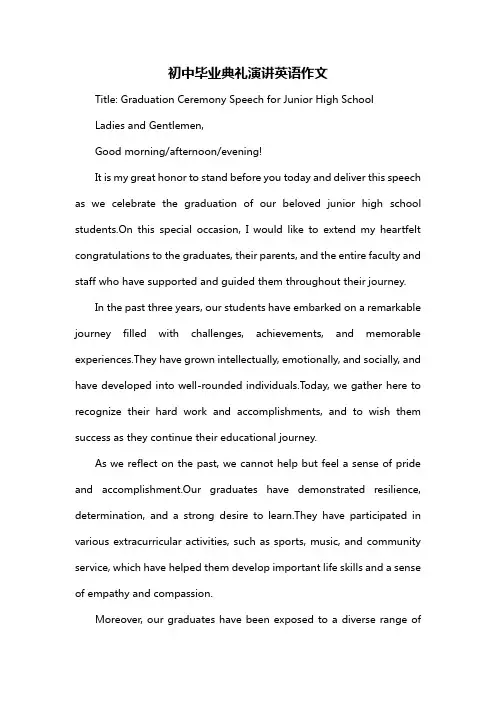
初中毕业典礼演讲英语作文Title: Graduation Ceremony Speech for Junior High SchoolLadies and Gentlemen,Good morning/afternoon/evening!It is my great honor to stand before you today and deliver this speech as we celebrate the graduation of our beloved junior high school students.On this special occasion, I would like to extend my heartfelt congratulations to the graduates, their parents, and the entire faculty and staff who have supported and guided them throughout their journey.In the past three years, our students have embarked on a remarkable journey filled with challenges, achievements, and memorable experiences.They have grown intellectually, emotionally, and socially, and have developed into well-rounded individuals.Today, we gather here to recognize their hard work and accomplishments, and to wish them success as they continue their educational journey.As we reflect on the past, we cannot help but feel a sense of pride and accomplishment.Our graduates have demonstrated resilience, determination, and a strong desire to learn.They have participated in various extracurricular activities, such as sports, music, and community service, which have helped them develop important life skills and a sense of empathy and compassion.Moreover, our graduates have been exposed to a diverse range ofsubjects and have acquired a solid foundation in mathematics, science, language arts, and social studies.They have developed critical thinking skills, problem-solving abilities, and effective communication skills, which will serve them well in their future endeavors.As they transition to high school, we encourage our graduates to embrace new challenges and to continue their quest for knowledge.High school will present new opportunities and experiences, and our graduates must be prepared to face them with confidence and determination.We trust that the values and skills they have acquired here will guide them on their path to success.In conclusion, I would like to congratulate our graduates once again for their hard work and dedication.We are proud of you, and we wish you all the best as you embark on the next chapter of your lives.Remember, the future belongs to those who believe in the beauty of their dreams, and we have no doubt that our graduates will achieve great things.Thank you, and congratulations again!。
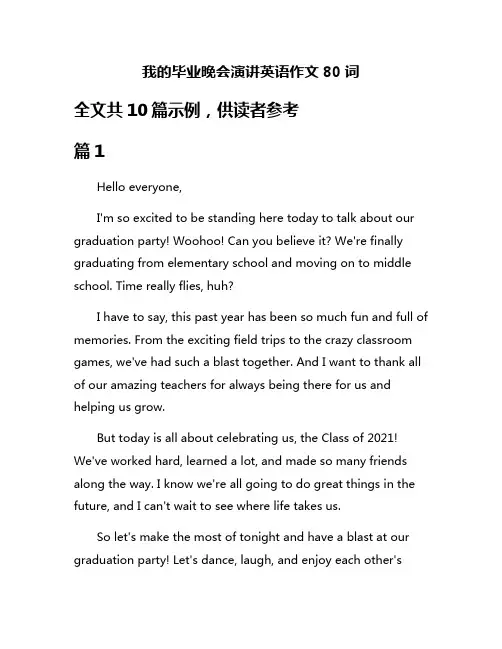
我的毕业晚会演讲英语作文80词全文共10篇示例,供读者参考篇1Hello everyone,I'm so excited to be standing here today to talk about our graduation party! Woohoo! Can you believe it? We're finally graduating from elementary school and moving on to middle school. Time really flies, huh?I have to say, this past year has been so much fun and full of memories. From the exciting field trips to the crazy classroom games, we've had such a blast together. And I want to thank all of our amazing teachers for always being there for us and helping us grow.But today is all about celebrating us, the Class of 2021!We've worked hard, learned a lot, and made so many friends along the way. I know we're all going to do great things in the future, and I can't wait to see where life takes us.So let's make the most of tonight and have a blast at our graduation party! Let's dance, laugh, and enjoy each other'scompany one last time before we go our separate ways. And remember, no matter where we end up, we'll always be a part of this awesome Class of 2021.Thank you all for making these past years so special. Let's make some more memories tonight and celebrate the end of one chapter and the beginning of a new one. Congratulations to us all! Go Class of 2021! Go team!Thank you!篇2Hello everyone,I am so excited to be standing here today to share with you all my experience at our graduation party! It has been an amazing journey full of laughter, tears, and unforgettable memories. I want to take this opportunity to express my gratitude to all my friends, teachers, and family for their support and love throughout these years.First of all, I want to thank our teachers for their dedication and hard work. They have not only taught us important knowledge but also inspired us to strive for excellence and nevergive up. I will always remember the lessons they have taught us and the impact they have had on our lives.Next, I want to thank my friends for always being there for me. We have shared so many happy moments together, from playing games in the playground to studying late at night for exams. I will cherish these memories forever and I am grateful to have such amazing friends in my life.Last but not least, I want to thank my family for their unconditional love and support. They have always been there for me, cheering me on and encouraging me to follow my dreams. I am so lucky to have such a loving family and I will always be grateful for everything they have done for me.As we celebrate our graduation today, let us remember the good times we have shared, the lessons we have learned, and the friendships we have made. Let us look forward to the future with hope and excitement, knowing that we have the knowledge and skills to achieve our dreams.Thank you all for being a part of my journey. I will always remember this special day and the wonderful people who have made it possible. Congratulations to all my fellow graduates, we did it! Let's make the world a better place with our passion and determination. Thank you!篇3Hello everyone,I'm so happy to be standing here today at our graduation party! It's been such an amazing journey with all of you and I can't believe it's finally coming to an end. We've laughed together, cried together, studied together, and now we're celebrating together!I want to take this opportunity to thank all of our teachers for their hard work and dedication. They've been there for us every step of the way, guiding us and inspiring us to be the best we can be. Without them, we wouldn't be here today, so let's give them a big round of applause!I also want to thank all of my classmates for making these past years so memorable. From the late-night study sessions to the fun times we've had together, I wouldn't have wanted to go through this journey with anyone else. You guys are like my second family and I will always cherish the memories we've created together.As we move on to the next chapter of our lives, let's remember the lessons we've learned here and carry them with us wherever we go. Let's continue to work hard, follow our dreams,and never give up on ourselves. I know that each and every one of us has the potential to do great things, so let's go out there and make our mark on the world!Congratulations to my fellow graduates! We did it!Thank you.篇4Hello everyone, my name is Lily and I am so excited to be standing here today to talk about our graduation party. First of all, I want to say a big congratulations to all of us for making it this far and graduating from elementary school!I can't believe that we are finally having our graduation party.I remember when we first started school, we were all so nervous and didn't know what to expect. But look at us now, all grown up and ready to take on the next chapter of our lives.I want to thank our teachers for all their hard work and dedication in helping us learn and grow. They have been there for us every step of the way and we couldn't have done it without them.I also want to thank our parents for their love and support. They have always been there to cheer us on and encourage us todo our best. We couldn't have made it through this journey without them by our side.As we move on to middle school, let's remember the friendships we have made and the memories we have shared. Let's continue to work hard and chase our dreams, knowing that we have what it takes to succeed.So let's celebrate today and make the most of this special moment. Congratulations again to all of us, we did it! Thank you and let's have an amazing graduation party! Thank you!篇5Hello everyone,I am so excited to be here today to speak at our graduation party. It's hard to believe that we are finally graduating from elementary school and moving on to middle school. I want to take this opportunity to thank all of our teachers, parents, and friends for supporting us throughout this journey.First of all, I want to thank our teachers for their hard work and dedication. They have taught us so much over the past few years and have helped us grow both academically and personally. They have been patient with us, encouraged us when we neededit, and pushed us to be the best that we can be. Without them, we wouldn't be standing here today, ready to take on the next chapter of our lives.Next, I want to thank our parents for their love and support. They have been there for us every step of the way, cheering us on at school events, helping us with our homework, and always believing in us. Their encouragement and guidance have been invaluable, and we are so grateful for everything they have done for us.Lastly, I want to thank my friends for always being there for me. We have shared so many memories together, from fun times on the playground to late-night study sessions. I know that as we move on to middle school, we will always have each other's backs no matter what.As we say goodbye to elementary school and look forward to the adventures that await us in middle school, I want to remind my classmates to never stop dreaming, working hard, and believing in themselves. The future is bright, and I know that we all have what it takes to achieve our goals and make our dreams come true.Congratulations to my fellow graduates. Let's make the most of this new chapter in our lives and continue to shine bright. Thank you.篇6Hello everyone,I'm so excited to be here today at our graduation party! I can't believe we made it through elementary school, and now we're moving on to middle school. It feels like just yesterday we were in kindergarten together, learning our ABCs and 123s.I want to take a moment to thank all of our teachers for helping us grow and learn over the years. They've taught us so many things, from math and science to reading and writing. They've also taught us important life lessons, like the value of hard work and the importance of being kind to others.I also want to thank my classmates for always being there for me. We've laughed together, cried together, and gone through so many ups and downs together. I'll never forget the memories we've made and the friendships we've formed.As we move on to middle school, I know there will be new challenges and new adventures waiting for us. But I believe ineach and every one of you, and I know we can achieve anything we set our minds to.So let's celebrate today and cherish the memories we've made together. Let's be proud of all that we've accomplished so far, and let's look forward to the bright future ahead.Thank you, and congratulations to the class of [year]!篇7Hello everyone,I'm so excited to be standing here today at our graduation party! I can't believe we're finally done with elementary school. It feels like just yesterday we were nervous little first graders, and now here we are, all grown up and ready to move on to middle school.I want to take this opportunity to thank all of our teachers for helping us learn and grow over the years. They've been patient with us, guided us, and believed in us even when we didn't believe in ourselves. They've taught us so much more than just math and science; they've taught us about friendship, kindness, and perseverance.I also want to thank my classmates for being the best friends I could ask for. We've had so many fun times together, from recess antics to field trips to group projects. I'll never forget the memories we've made together, and I know that we'll always have a special bond no matter where we go in the future.As we move on to middle school, let's remember the lessons we've learned here and continue to be kind, curious, and hardworking. Let's support each other and never forget the friendships we've made. I can't wait to see what the future holds for all of us.Congratulations, Class of 2021! We did it!篇8Hello everyone,I am so excited to be standing here today at our graduation party! It's been a long journey, but we finally made it! I want to thank all my teachers, friends, and family for their support and encouragement throughout the years.I remember the first day of school, when I was so nervous and scared to be away from my parents. But now, after all theseyears, I have made so many wonderful memories and friends that I will cherish forever.I want to thank all my teachers for their guidance and patience. They have taught me so many things and helped me grow into the person I am today. I also want to thank my friends for always being there for me, for making me laugh, and for sharing amazing moments together.As we prepare to say goodbye to our school and move on to new adventures, I want to encourage everyone to never stop learning and growing. Life is full of challenges and opportunities, and it's up to us to make the most of them.I am so grateful for this experience and I will always treasure the memories we have created together. I wish all of you the best of luck in the future and hope that we will always stay connected.Thank you once again for everything and let's make this graduation party a night to remember!Thank you!篇9Hello everyone,I can't believe today is finally here, our graduation party! It feels like just yesterday we were all starting elementary school together. And now, we are graduating and moving on to a new chapter in our lives. I am so excited and a little bit sad at the same time.I want to take this opportunity to thank all of my teachers, friends, and family for supporting me throughout my elementary school journey. Without your encouragement and guidance, I wouldn't be standing here today giving this speech.I have so many wonderful memories from my time in elementary school. From field trips to class projects, from recess to lunchtime chats with friends, each moment has shaped me into the person I am today. I will always cherish these memories and hold them close to my heart.As we all move on to middle school, I know that we will face new challenges and experiences. But I am confident that we are all prepared and ready for whatever comes our way. We have learned so much in elementary school, and now it is time to put that knowledge to the test.I want to wish each and every one of you the best of luck in all your future endeavors. I know that we will all do great thingsand make our elementary school proud. Congratulations to the Class of [year], we did it!Thank you.篇10Hello everyone! My name is Lily and I am so excited to be standing here at our graduation party to give a speech. I can't believe we are finally graduating from elementary school and moving on to middle school. It feels like just yesterday we were in kindergarten, learning our ABCs and 123s.I want to take this opportunity to thank our teachers for all their hard work and dedication in helping us learn and grow. They have been there for us every step of the way, teaching us not just academic subjects but important life lessons as well. I also want to thank our parents for their love and support throughout our elementary school years. They have always been there for us, cheering us on and encouraging us to do our best.As we say goodbye to elementary school and prepare to enter middle school, I want to remind my classmates to always stay true to themselves and follow their dreams. We have the power to achieve anything we set our minds to, and I have nodoubt that each and every one of us will go on to do amazing things in the future.So let's make the most of tonight, celebrate our accomplishments, and look forward to the exciting new adventures that await us in middle school. Thank you all for being such wonderful friends and classmates. I will never forget the memories we have shared together. Congratulations to the Class of 2023!。
Graduation Ceremony Speech
Good afternoon, ladies and gentlemen! Today is a special day, I’m so glad to have a precious opportunity to give a graduation speech for you. At this moment, my mood is very complex, both excited and sad.
Four years ago, we were high school students, young and energetic. But now we are college graduates, ambitious and passionate. We are going to enter society to show our talents, to start a new life and to have a bright future. Maybe some of you are worrying about jobs and some of you are worrying about the college romance. However, I firmly believe that most of you are expected to celebrate the upcoming new life.
Do you have the same feeling with me?---When I was a freshman, I wanted to get good marks. When I was a sophomore, I wanted to find a girlfriend. When I was a junior, I wished I can pass the judicial test. When I was a senior, I understood what I needed to do was to let nature take its course! Looking back now, I realize that the four-year college life is slipping away. To be honest, I start to miss all the days we spent together now—I miss the days with roommates playing on the pitch, I miss the romance with girlfriend when we whispered in the library. In a word, I miss all the dribs and drabs in the campus life.
Respectively is bitter, but we can look forward to the joy of reunion. Now, I give my best wishes to your: wish everyone a good future. Thank you!
洪清锋2011214414。